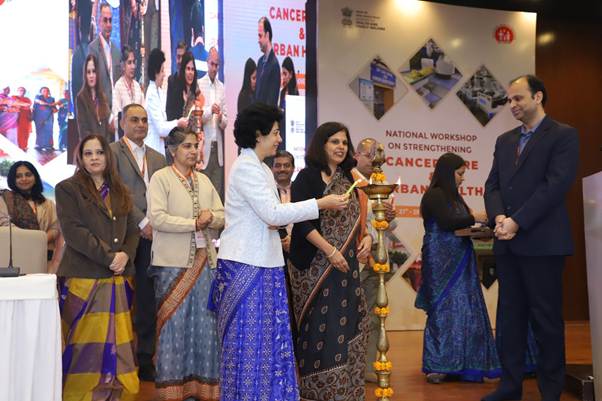“Strengthening India’s Cooperative Ecosystem”
Key Takeaways
|
Introduction
Gujarat State Cooperative Marketing Federation Limited (GUJCOMASOL) in Gujarat, the Lahoul Potato Growers Cooperative Society in Himachal Pradesh, the Jharkhand Women’s Self-Supporting Poultry Cooperative Federation, and the Vitthalrao Shinde Sahakari Sakhar Karkhana in Maharashtra – these successful cooperative models exemplify the strength and reach of India’s cooperative movement.
Behind their success stands the National Cooperative Development Corporation (NCDC), a statutory organisation under the Ministry of Cooperation, Government of India, established in 1963. The objectives and functions of NCDC include:
- Promoting, strengthening and developing farmer cooperatives for increasing production, productivity and instituting post-harvest facilities
- Providing assistance for development of cooperatives in sectors of processing, storage, cold chain and marketing of agriculture produce and the supply of seeds, fertilizer and other agricultural inputs etc.
- In addition to agricultural initiatives, NCDC supports income-generating cooperatives across various non-farm sectors such as weaker section activities which include dairy, livestock, handloom, sericulture, poultry, fishery, scheduled caste & scheduled tribes, women cooperatives etc.
- NCDC provides financial assistance to the cooperative sector for their economic development and social upliftment through NCDC Sponsored schemes and various GoI schemes implemented by NCDC
Over the years, the National Cooperative Development Corporation (NCDC) has demonstrated a strong and sustained commitment to strengthening India’s cooperative ecosystem through continuous financial support. The Corporation’s disbursements have grown impressively from Rs.5,735.51 crore in 2014-15 to Rs.95,182.88 crore in 2024–25, reflecting its expanding outreach across sectors. Continuing this upward trajectory, during 2025–26, NCDC has already disbursed Rs.49799.06 crore till October 2025, signalling robust progress in the current financial year. In addition, to promote inclusivity and equity, NCDC has extended Rs.57.78 crore in loans over the last four years (FY 2021-22 to FY 2024-25) to SC/ST cooperatives, ensuring that the benefits of cooperative development reach every section of society.
Through this sustained increase in financial support, NCDC has broadened its developmental footprint, enabling cooperatives to upgrade infrastructure, strengthen value chains, and diversify into high-growth sectors. The notable rise in disbursements reflects not only growing demand for cooperative-led development but also NCDC’s enhanced institutional capacity to deliver timely and targeted credit. Collectively, these interventions demonstrate NCDC’s pivotal role in advancing an inclusive, market-responsive, and self-reliant cooperative ecosystem in India.
| The cooperative sector forms a strong pillar of the Indian economy, playing a key role in social and economic development, rural infrastructure, and employment generation. Cooperatives are active in a wide range of fields such as credit and banking, fertilisers, sugar, dairy, marketing, consumer goods, handloom, handicrafts, fisheries, and housing. India today has more than 8.44 lakh cooperatives with a membership of over 30 crore people, and nearly 94% of farmers are linked with cooperatives in some capacity. Given their crucial role in supporting rural livelihoods, it is important to strengthen cooperatives in sectors such as dairy, poultry, livestock, fisheries, sugar, textiles, processing, storage, and labour. Extending long-term and working capital loans to these cooperatives will help them expand their operations, improve income generation, and ensure sustainable growth in rural areas. |
Dedicated Efforts of NCDC
The National Cooperative Development Corporation (NCDC) has introduced several targeted schemes to strengthen different segments of the cooperative sector and promote innovation, inclusivity, and modernisation.
Yuva Sahakar-Cooperative Enterprise Support and Innovation Scheme
Launched in FY 2019–20, the scheme is designed to promote cooperative start-ups across diverse sectors by supporting newly formed cooperatives with innovative ideas. The scheme encourages Young (Yuva) Entrepreneur Cooperative Societies that are in operation for a minimum of 3 months. It is linked to a Cooperative Start-up and Innovation Fund created by NCDC, with preferential support extended to cooperatives in the North Eastern Region, those operating in Aspirational Districtsidentified by NITI Aayog, and cooperatives comprising exclusively women, SC, ST, or PwD members.
Eligibility:
- a) Any type of cooperative society with new, innovative, and value chain enhancement intended projects.
- b) It should be in operation for a minimum of three
- c) It should have a positive net-worth.
- d) It should not have incurred cash loss during previous year(s) of operation, as applicable, and no cash loss in the past three years (if the society is in operation for more than 3 years).
Number of cooperative societies that have received support from NCDC to implement projects under the Yuva Sahakar scheme since 2019 are as under:
| No. of implementing cooperative Societies | Amount Sanctioned (Rs. in crore) | Amount Released (Rs. in crore)
|
| 32 | 49.35 | 3.71 |
Ayushman Sahakar
Launched in the FY 2020-21, Ayushman Sahakar adopts a holistic approach to strengthening the healthcare ecosystem through cooperative institutions.
It aims to assist cooperative societies:
- a) To provide affordable and holistic healthcare through hospitals/ healthcare/ education facilities by cooperative societies,
- b) To promote AYUSH facilities by cooperative societies,
- c) To meet the objectives of the National Health Policy,
- d) To participate in the National Digital Health Mission,
- e) To provide comprehensive healthcare including education, services, insurance, and activities related thereto.
Eligibility:
Any Cooperative Society registered under any State/Multi-State Cooperative Societies Act in the country, with a suitable provision in the bye-laws to undertake services related to hospital/healthcare/health education.
The number of cooperative societies that have received support from NCDC to implement projects under the Ayushman Sahakar scheme since its inception till FY 2024-25 are as under:
| No. of implementing cooperative Societies | Amount Sanctioned (Rs. in crore) | Amount Released (Rs. in crore) |
| 9 | 161.90 | 43.19 |
Dairy Sahakar
Launched in FY 2021–22, Dairy Sahakar aims to strengthen dairy cooperatives by offering financial assistance for both new projects and the modernization or expansion of existing infrastructure. The scheme supports end-to-end dairy sector activities, including bovine development, milk procurement and processing, quality assurance, value addition, branding, packaging, marketing, transportation, storage, and export of dairy products.
Additionally, NCDC extends financial support to a range of related services and enabling activities such as renewable energy adoption, ICT solutions, cattle feed and supplement manufacturing, research and development, packaging material manufacturing, manufacturing of dairy equipment and machinery, dairy-related maintenance services, manufacturing of veterinary drugs, delivery of veterinary healthcare services, as well as education and capacity development in the veterinary/dairy education.
Eligibility:
Any Cooperative Society registered under any State/Multi-State Cooperative Societies Act in the country, with a suitable provision in the bye-laws.
Assistance sanctioned and disbursed under Dairy Sahakar (Since 31.10.2021) till 2024-25:
| No. of implementing cooperative Societies | Amount Sanctioned (Rs. in crore) | Amount Released (Rs. in crore)
|
| 16 | 162.28 | 177.72 |
Digital Sahakar
The scheme, operational since 2021-22, is aligned with the vision of Digital India. It provides financial and technical assistance to promote digitally empowered cooperatives, ensuring better credit access and facilitating seamless linkage with government grants, subsidies, and incentives.
Eligibility:
Any Cooperative Society registered under any State/Multi-State Cooperative Societies Act is eligible for financial assistance under the scheme. FPOs, FFPOs, and federated SHG cooperatives are also eligible. Assistance is provided by NCDC either directly to the cooperatives or through State Governments/ UT Administrations.
Deerghavadhi Krishak Punji Sahakar Yojana
Deerghavadhi Krishak Punji Sahakar Yojana, launched in 2022-23, offers long-term financial assistance to agricultural credit cooperatives. It enables them to extend credit for a wide range of agricultural activities, commodities, and services falling under the NCDC’s mandate:
- To ensure increased and uninterrupted credit flow to cooperatives and their members.
- To boost capital formation in the agriculture and allied sectors.
- To support non-farm sector activities, thereby promoting alternate employment opportunities in rural and semi-urban areas.
Eligibility:
The following types of Agricultural Credit Cooperatives will be eligible for NCDC’s loan under this scheme:
- Primary Agricultural Credit Cooperatives (PACS)
- District Central Cooperative Banks (DCCBs)
- State Cooperative Banks (StCBs)
- Primary Cooperative Agriculture & Rural Development Banks (PCARDS)
- State Cooperative Agriculture & Rural Development Banks (SCARDS)
Assistance sanctioned and disbursed under Deerghavadhi Krishak Punji Sahakar Yojana till 2024-25:
| No. of implementing cooperative Societies | Amount Sanctioned (Rs. in crore) | Amount Released (Rs. in crore)
|
| 5 | 5400.76 | 2137.00 |
Support to Women Cooperatives
Additionally, National Cooperative Development Corporation (NCDC) is also implementing the exclusive schemes for women cooperatives: a. Swayam Shakti Sahakar Yojana, and b. Nandini Sahakar. These initiatives play a significant role in empowering women and strengthening their contribution to rural economic development.
Swayam Shakti Sahakar Yojana
The scheme, launched in the FY 2022-23, provides financial assistance to agricultural credit cooperatives for extending loans and advances to women self-help groups (SHGs). Under this scheme, Primary Agricultural Credit Societies (PACS), District Central Cooperative Banks (DCCBs), State Cooperative Banks (StCBs) and SHGs Federated Cooperatives/Cooperative Federations are eligible for loan from NCDC. By enhancing access to credit, the scheme plays a key role in strengthening women’s participation in rural economic activities.
Nandini Sahakar
It aims to empower women by promoting their participation in cooperatives. It helps women-led cooperatives by providing support in business planning, enterprise development, capacity building, and access to finance through credit, subsidies, and interest subvention from other government schemes. The scheme has been in operation since the financial year 2020-21.
Eligibility:
| No. of women cooperatives assisted by NCDC from FY 2021-22 to FY 2024-25 | Amount sanctioned from FY 2021-22 to FY 2024-25 (Rs. in crore) | Amount released from FY 2021-22 to FY 2024-25 (Rs. in crore)
|
| 34 | 6283.71 | 4823.68 |
Any Women Cooperative Society registered under any State/Multi-State Cooperative Societies Act in the country is eligible. Any cooperative society with a minimum of 50% women members at the primary level is also eligible. In case of projects related to new and/ or innovative activities, women cooperatives that are in operation for at least three months are also eligible for assistance.
|
Erstwhile Central Sector Scheme for Grant-in-Aid to National Cooperative Development Corporation
Under the Grant-in-Aid to NCDC for Strengthening of Cooperative Sugar Mills scheme, the Government has provided a grant of Rs.1,000 crore to the National Cooperative Development Corporation during 2022–23 and 2024–25. Using this support, NCDC extends loans of up to Rs.10,000 crore to cooperative sugar mills for establishing ethanol or cogeneration plants, and for meeting working capital needs. To make credit more accessible, NCDC has revised its funding pattern from 70:30 to 90:10, so that societies have to contribute only 10 percent of the project cost, with the rest financed by NCDC. The interest rate for term loans has also been reduced to 8.5 percent.
Through this scheme, NCDC has disbursed Rs.10,005 crore financial assistance to
56 cooperative sugar mills across the country.
Schemes of other Ministries
To provide a comprehensive overview, it is important to highlight NCDC’s engagement in additional initiatives. The Corporation also implements several Central Sector and Centrally Sponsored schemes of the Government of India, supporting the holistic development of cooperative institutions across sectors, including agriculture, horticulture, fisheries, dairy, livestock, food processing, marketing, storage, and cold chain infrastructure.
Recent Developments in Cooperative Sector
Grant-in-aid support to NCDC for Cooperative Sector Development
The Union Cabinet has approved a Central Sector Scheme “Grant in aid to National Cooperative Development Corporation (NCDC) “with a total outlay of Rs.2,000 crore for the period 2025–26 to 2028–29. Under this scheme, Rs.500 crore will be released annually, enabling NCDC to leverage these grants and mobilise nearly Rs.20,000 crore from the open market over the four-year period.
This enhanced financial capacity will help NCDC to extend loans to cooperative societies for setting up new ventures, expanding existing plants, and meeting their working capital requirements. Approximately 2.9 crore members of 13,288 Cooperative societies across diverse sectors such as Dairy, Livestock, Fisheries, Sugar, Textile, Food Processing, Storage and Cold Storage, Labour, and Women-led cooperatives nationwide are expected to benefit.
National Cooperative Society Policy
The National Cooperation Policy (NCP) 2025 sets out a clear vision for revitalising India’s cooperative movement in line with the nation’s goal of becoming Viksit Bharat by 2047. Guided by the spirit of Sahkar-se-Samriddhi, the policy seeks to strengthen the cooperative framework, promote inclusive economic growth, and empower rural communities through collective participation. It focuses on building a supportive legal, economic, and institutional environment that enables cooperatives to become transparent, technology-driven, and professionally managed enterprises. The initiative is being implemented by the National Cooperative Development Corporation (NCDC) in collaboration with seven major cooperative institutions – IFFCO, NAFED, Amul, KRIBHCO, NDDB, NCEL, and NABARD-fostering cooperation among cooperatives to drive sustainable development.
Conclusion
The National Cooperative Development Corporation remains a cornerstone of India’s cooperative growth, driving inclusive economic growth through sustained financial performance and sectoral inclusivity. With expanding financial support and impactful schemes such as Yuva Sahakar, Ayushman Sahakar, Dairy Sahakar, Digital Sahakar, Swayam Shakti Sahaka rand Nandini Sahakar have strengthened diverse segments ranging from agriculture and dairy to healthcare, digital empowerment, and women-led enterprises.
With continued assistance to cooperatives in sugar, dairy, fisheries, and other key sectors, NCDC has demonstrated its pivotal role in fostering self-reliance and inclusive development. The recent Grant-in-Aid scheme and the National Cooperation Policy 2025 further reinforce the Government’s commitment to building a transparent, technology-driven, and globally competitive cooperative sector. As cooperatives continue to expand their footprint across the country, NCDC’s role in providing accessible finance, capacity-building, and strategic sectoral interventions will remain pivotal. Through its sustained efforts, NCDC is not only empowering cooperative institutions but also contributing significantly to India’s journey towards self-reliance and sustainable rural prosperity.
References
Ministry of Cooperation
National Cooperative Development Corporation
https://www.ncdc.in/index.jsp?page=successful-cooperatives
https://www.ncdc.in/documents/booklet/2609240524English-Compendium-as-on-22.05.2024.pdf
Lok Sabha
Rajya Sabha
https://sansad.in/getFile/annex/268/AU2591_4ZHE2g.pdf?source=pqars
https://sansad.in/getFile/annex/268/AU1129_3OlIvD.pdf?source=pqars
PIB Press Release
https://www.pib.gov.in/PressReleseDetailm.aspx?PRID=2152473
https://www.pib.gov.in/PressReleasePage.aspx?PRID=2155612
https://www.pib.gov.in/PressReleasePage.aspx?PRID=2150641
https://www.pib.gov.in/PressReleasePage.aspx?PRID=2153188
https://www.pib.gov.in/PressReleasePage.aspx?PRID=2150238
https://www.pib.gov.in/PressReleasePage.aspx?PRID=2112725
https://www.pib.gov.in/PressReleasePage.aspx?PRID=2155612
https://www.pib.gov.in/PressReleasePage.aspx?PRID=2150641
https://www.pib.gov.in/FactsheetDetails.aspx?Id=149229
https://www.pib.gov.in/PressReleasePage.aspx?PRID=2157873
https://www.pib.gov.in/PressReleasePage.aspx?PRID=2082789
***





